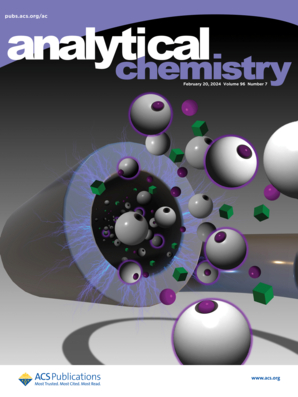Coupling Immunoprecipitation with Multiplexed Digital PCR for Cell-Free DNA Methylation Detection in Small Plasma Volumes of Early-Onset Colorectal Cancer
IF 6.7
1区 化学
Q1 CHEMISTRY, ANALYTICAL
引用次数: 0
Abstract
Colorectal cancer (CRC) remains a major global health challenge, with an increasing incidence of early-onset cases among young adults. Targeted analysis of cell-free DNA (cfDNA) methylation in blood has emerged as a promising minimally invasive diagnostic approach. While digital PCR (dPCR) offers high sensitivity and low turnaround times, conventional bisulfite-based dPCR assays require large plasma volumes due to cfDNA degradation, limiting clinical feasibility. To overcome this limitation, we developed a bisulfite-free, low-plasma-volume assay by coupling cell-free methylated DNA immunoprecipitation (cfMeDIP) with multiplexed dPCR for methylation detection. Assays were designed for CRC targets based on publicly available bisulfite-based plasma data and optimized for native, bisulfite-untreated cfDNA. The cfMeDIP-dPCR assays were first developed and optimized on circulating tumor DNA surrogates derived from HCT116 cells and subsequently validated in a pilot study, including 32 early-onset CRC (EO-CRC) patients and 29 non-CRC individuals. Methylation ratios, defined as the proportion of methylated to total cfDNA copies per marker, served as a diagnostic indicator. Three out of four selected markers (SEPT9, KCNQ5, and C9orf50) were successfully adapted, with significantly higher methylation ratios (p ≤ 0.001) in the EO-CRC cohort. KCNQ5 demonstrated the highest diagnostic performance, achieving an 85% sensitivity at a 90% specificity, with methylation ratios correlating with the tumor stage. This study presents the first cfMeDIP-dPCR approach, demonstrating its potential as a sensitive liquid biopsy assay. Requiring only 0.5 mL of plasma, i.e., more than 20 times less than a sensitivity-matched bisulfite-based assay, cfMeDIP-dPCR facilitates clinical implementation for CRC and other diseases with epigenetic signatures.

免疫沉淀与多重数字PCR耦合检测早发性结直肠癌小血浆体积游离DNA甲基化
结直肠癌(CRC)仍然是一个主要的全球健康挑战,年轻成人中早发病例的发病率不断上升。血液中游离DNA (cfDNA)甲基化的靶向分析已成为一种有前途的微创诊断方法。虽然数字PCR (dPCR)具有高灵敏度和低周转时间,但由于cfDNA降解,传统的亚硫酸盐基dPCR检测需要大血浆容量,限制了临床可行性。为了克服这一限制,我们开发了一种无亚硫酸盐、低血浆体积的检测方法,通过将无细胞甲基化DNA免疫沉淀(cfMeDIP)与多重dPCR相结合进行甲基化检测。根据公开的亚硫酸根血浆数据,设计了针对CRC靶点的检测方法,并对原生的、亚硫酸根未处理的cfDNA进行了优化。cfMeDIP-dPCR检测首先针对来自HCT116细胞的循环肿瘤DNA替代物进行了开发和优化,随后在一项包括32名早发性CRC (EO-CRC)患者和29名非CRC个体的初步研究中进行了验证。甲基化比率,定义为每个标记的甲基化与总cfDNA拷贝的比例,作为诊断指标。四个选择的标记中有三个(SEPT9、KCNQ5和C9orf50)被成功适应,在EO-CRC队列中具有显着更高的甲基化比率(p≤0.001)。KCNQ5表现出最高的诊断性能,达到85%的敏感性和90%的特异性,甲基化比率与肿瘤分期相关。本研究首次提出cfMeDIP-dPCR方法,证明其作为一种灵敏的液体活检检测方法的潜力。cfMeDIP-dPCR只需要0.5 mL血浆,即比基于亚硫酸盐的灵敏度匹配的检测少20倍以上,有利于临床应用于结直肠癌和其他具有表观遗传特征的疾病。
本文章由计算机程序翻译,如有差异,请以英文原文为准。
求助全文
约1分钟内获得全文
求助全文
来源期刊

Analytical Chemistry
化学-分析化学
CiteScore
12.10
自引率
12.20%
发文量
1949
审稿时长
1.4 months
期刊介绍:
Analytical Chemistry, a peer-reviewed research journal, focuses on disseminating new and original knowledge across all branches of analytical chemistry. Fundamental articles may explore general principles of chemical measurement science and need not directly address existing or potential analytical methodology. They can be entirely theoretical or report experimental results. Contributions may cover various phases of analytical operations, including sampling, bioanalysis, electrochemistry, mass spectrometry, microscale and nanoscale systems, environmental analysis, separations, spectroscopy, chemical reactions and selectivity, instrumentation, imaging, surface analysis, and data processing. Papers discussing known analytical methods should present a significant, original application of the method, a notable improvement, or results on an important analyte.
 求助内容:
求助内容: 应助结果提醒方式:
应助结果提醒方式:


